Advertisements
Advertisements
Question
Rearrange the following words and phrases to form meaningful sentences.
- of the owner / a computer virus / that can / infect a / computer / is a program / without the knowledge
- can spread / or even a CD / a true virus / through the Internet / or a USB drive
- infect / viruses / file system / the network / the host files / corrupting / of
- install / anti-virus / many users / known viruses / software that / can detect and eliminate
Solution
- A computer virus is a program that can infect a computer without the knowledge of the owner.
- A true virus can spread through the Internet or even a CD or a USB drive.
- Viruses infect the host files, corrupting the network of file system.
- Many users install anti-virus software that can detect and eliminate known viruses.
APPEARS IN
RELATED QUESTIONS
Here are some direct quotations from the story. Identify the speaker and write what each quotation suggests about the speaker. You can use the adjectives given in the box and may also add your own.
| amiable, tender, gentle, sympathetic, understanding, determined, diligent, kind, concerned, systematic, wise, helpful, enthusiastic, selfish, cruel, humble, religious, prudent |
| Speaker | Quotation | Quality Highlighted | |
|
a. |
'Avva, is everything all right? Are you O.K.?' |
||
| b. | 'At times, I used to regret not going to school, so I made sure that my children and grandchildren studied well.' |
||
| c. | 'Avva, don't cry. What is the matter? Can I help you in anyway?' |
||
| d. | 'We are well-off, but what use is money when I cannot be independent.' | ||
| e. | 'I will keep Saraswati Pooja day during Dassara as the deadline.' | ||
| f. | 'For a good cause if you are determined you can overcome any obstacle.' | ||
| g. | I am touching the feet of a teacher not my granddaughter.' |
The sequence of events has been jumbled up. Rearrange them and complete the given flowchart.
(1) Major Percy and Bill come to the house.
(2) Harold comes to know that his father is a boxer.
(3) Bill tells his wife that he is doing it for Harold.
(4) Jerry Fisher tries to convince Bill to reconsider.
(5) Mrs. Bramble is amazed to think that she has brought such a prodigy as Harold into the world.
(6) Harold wants to know what will happen to the money he had bet on Murphy losing.(7) Mrs. Bramble is informed that Bill had decided not to fight.
(8) Mrs. Bramble resumes work of darning the sock.
(9) Harold is alone with his mother in their home.
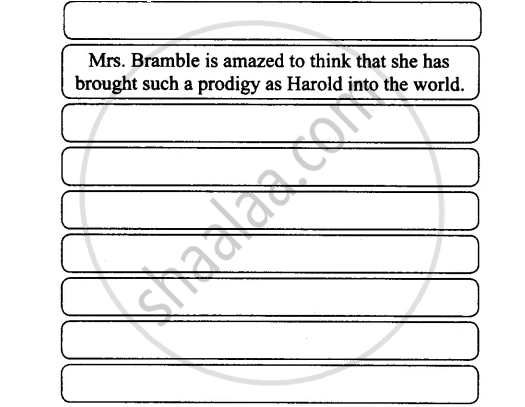
Answer the following questions:
How does the brook ‘sparkle’?
Below are certain words that appear in the story of Amelia Earhart's journey.The meanings have been given in a jumbled order. Match the words with their meanings.
| Words | Meanings |
| 1.Navigator | (a) an infection of the bowels |
| 2.Skirting | (b) a person who flies an aircraft. |
| 3.Dysentery | (c) a person who plans a route for a ship or plane |
| 4.Parachute | (d) to put something in a safe place |
| 5.Cable | (e) to leave something with no intention of returning |
| 6.Precise | (f) to go or around the edge of something |
| 7.Transmit | (g) a device that is attached to people or objects to make them fall slowly and safely. |
| 8.Implement | (h) a small boat made of rubber or plastic that is filled with air. |
| 9.Raft | (i) a set of wires, covered in plastic or rubber that carries electricity or telephone signals |
| 10.Stowed | (j) carry out |
| 11.Aviator | (k) exact |
| 12.Abandoned | (l) to send an electric signal |
Here are a few questions and statements written down by the Cultural Secretary that she/ he needs to share. Tick the correct words from those given in brackets:
- How (much/many) (chair/chairs) do we need?
- (Much/Several) (school/schools) will be participating.
- (Several/Much) (student/students) have arrived.
- How (much/many) (information/informations) does this brochure give?
- We have only (a few/a little) sponsors for (some/much) events.
Look at the following pictures/diagrams. Fill in the blanks with an appropriate sentence/phrase, using suitable future time reference. The first one has been done for you as an example:
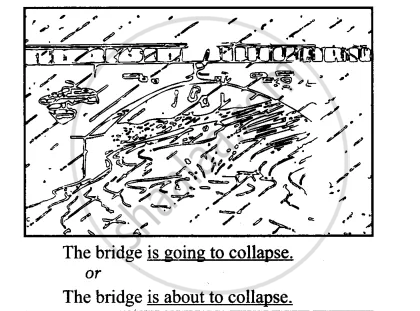
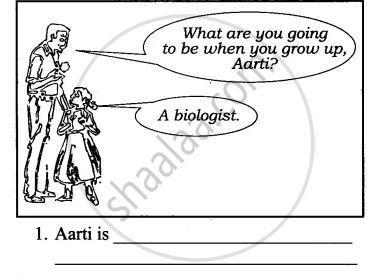

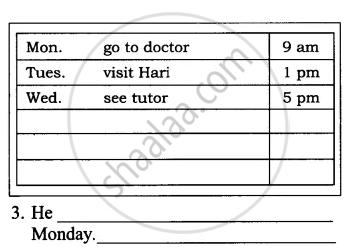
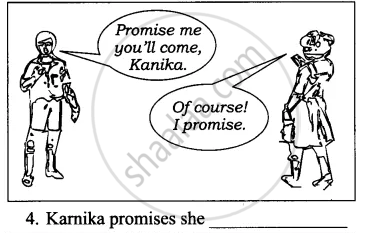
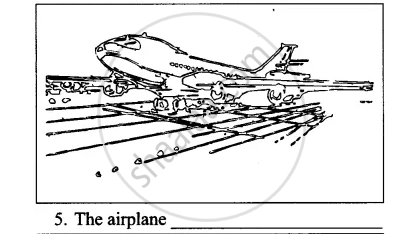
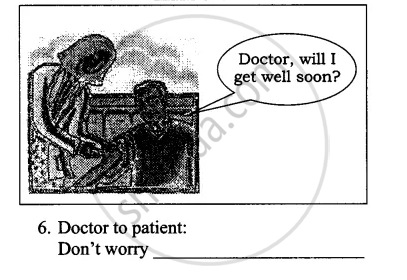
Write the contracted forms. Practise saying these words.
e.g. ought not to – oughtn’t to.
- cannot _______
- need not _______
- should not _______
- must not _______
- do not _______
- did not _______
When both students have completed their half of the table above, exchange information, by asking and answering questions e.g.
1. What's the weight of the football?
2. When do you get a penalty in hockey?
As you receive information from your partner, write it down in the other half of the table above. (Do not let your partner look at your table!)
On the basis of your reading of the exctract on Chess , complete the following table with your partner .
| Figure | Name | Order of importance | Function | Significance |
 |
||||
 |
||||
 |
||||
 |
||||
 |
||||
 |
Below is a description of Geothermal Energy. Complete the passage by filling in the gaps choosing the correct option from the given options. The first one has been done for you.
In volcanic areas, underground water (a) can often rise to a temperature of 200° C. Nowadays, wells (b) __________ drilled to extract the steam which is used to drive turbines. This is (c) __________ of the world’s fastest growing sources of energy. (d) __________ the water is heated by enormous reservoirs of cooling rock several kilometers across, geothermal steam is (e) __________ to be a renewable energy resource. Even in non- volcanic areas, underground water can (f) __________ heated by natural radioactivity. In this case, (g) __________, it is necessary to drill deeper before the water is as hot as 200° C. This method (h) __________ used for heating homes in certain areas for many years and is cheap, clean and efficient.
| (a) (i) could (ii) can (iii) must (iv) might |
(b) (i) is (ii) been (iii) are (iv) being |
(c) (i) any (ii) some (iii) one (iv) few |
(d) (i) As (ii) While (iii) Though (iv) Even |
| (e) (i) called (ii) said (iii) regarded (iv) told |
(f) (i) be (ii) been (iii) being (iv) is |
(g) (i) however (ii) though (iii) despite (iv) therefore |
(h) (i) being (ii) was (iii) be (iv) has been |
